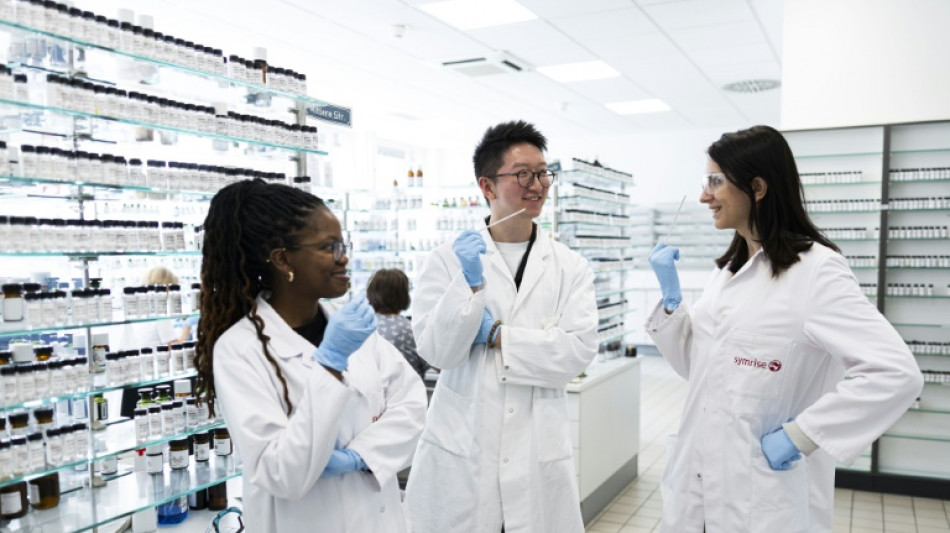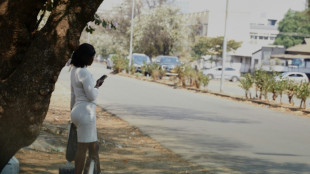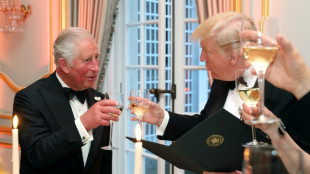
-
 Markets mixed ahead of expected US rate cut
Markets mixed ahead of expected US rate cut
-
Rubio takes up Qatar strike unease with Netanyahu

-
 US-China trade talks resume in Madrid
US-China trade talks resume in Madrid
-
Gaza aid flotilla carrying Greta Thunberg departs Tunisia

-
 New Nepal interim ministers sworn in after protests
New Nepal interim ministers sworn in after protests
-
Cluster bombs kill, wound over 1,200 in Ukraine since 2022: monitor

-
 Australia, Papua New Guinea to sign 'historic' defence deal
Australia, Papua New Guinea to sign 'historic' defence deal
-
Myanmar junta says no voting in dozens of constituencies

-
 Rubio to discuss Qatar aftermath, Gaza with Netanyahu
Rubio to discuss Qatar aftermath, Gaza with Netanyahu
-
Chinese factory, consumer activity slow amid economy struggles

-
 US cuts leave Zimbabwe sex workers scrambling for alternatives
US cuts leave Zimbabwe sex workers scrambling for alternatives
-
Alonso's Real Madrid revitalised for new Champions League mission

-
 Arsenal eye Champions League charge with revamped attack
Arsenal eye Champions League charge with revamped attack
-
'No regrets': wounded Nepali protesters proud at change

-
 Key Emmys moments: Children, Colbert, women and politics
Key Emmys moments: Children, Colbert, women and politics
-
'No regrets': wounded Nepalis protesters proud at change

-
 'Adolescence,' 'The Studio' dominate television's Emmy Awards
'Adolescence,' 'The Studio' dominate television's Emmy Awards
-
WTO fishing deal: the net results

-
 Malaysia's largest island state aims to be region's 'green battery'
Malaysia's largest island state aims to be region's 'green battery'
-
Philippines president says corruption scandal protests justified

-
 Asian markets fluctuate ahead of expected US rate cut
Asian markets fluctuate ahead of expected US rate cut
-
UK aristocrat, partner face jail over baby daughter's death

-
 Japan and Fiji cruise into Pacific Nations Cup rugby final rematch
Japan and Fiji cruise into Pacific Nations Cup rugby final rematch
-
As King Charles hosts Trump, what do UK state visits entail?

-
 First-ever Tanzanian gold as Simbu dips past Petros in world marathon
First-ever Tanzanian gold as Simbu dips past Petros in world marathon
-
100 days later, US federal workers navigate post-Musk wreckage

-
 Rising oceans to threaten 1.5 million Australians by 2050: report
Rising oceans to threaten 1.5 million Australians by 2050: report
-
Kipyegon bids for fourth 1500m world gold, Wanyonyi in loaded 800m

-
 'The Studio,' 'Severance' and 'Adolescence' among Emmy winners
'The Studio,' 'Severance' and 'Adolescence' among Emmy winners
-
Trump and King Charles: heads of state with opposing personalities

-
 Scheffler surges to PGA Procore victory in Ryder Cup warm-up
Scheffler surges to PGA Procore victory in Ryder Cup warm-up
-
Bloody Sunday trial of British ex-soldier to open in Belfast

-
 Trump heads for historic second UK state visit
Trump heads for historic second UK state visit
-
Turkey court tries case that could oust opposition leadership

-
 Simbu dips past Petros for world marathon gold
Simbu dips past Petros for world marathon gold
-
Mexico's macabre Island of the Dolls inspires Tim Burton and Lady Gaga

-
 Television stars shine bright on Emmys red carpet
Television stars shine bright on Emmys red carpet
-
'The Studio' claims early win as TV's Emmys kick off

-
 Japan rips Tonga to reach Pacific Nations Cup rugby final
Japan rips Tonga to reach Pacific Nations Cup rugby final
-
Australia's ANZ bank hit with record fine over 'widespread misconduct'

-
 Eagles top Chiefs in Super Bowl rematch as Cowboys edge Giants in NFL thriller
Eagles top Chiefs in Super Bowl rematch as Cowboys edge Giants in NFL thriller
-
Seattle's Raleigh hits 54th homer of season for MLB marks

-
 NFL Cowboys top Giants in overtime while Lions maul Bears
NFL Cowboys top Giants in overtime while Lions maul Bears
-
Trump concerned S. Korean arrests could 'frighten' investors

-
 Timeless Modric opens AC Milan account with winner against Bologna
Timeless Modric opens AC Milan account with winner against Bologna
-
Spring quick-fire hat-trick helps Racing stun Bordeaux-Begles

-
 Macau's first 'patriots' election sees low turnout
Macau's first 'patriots' election sees low turnout
-
Prince Harry says has 'clear conscience' over explosive memoir

-
 Modric opens AC Milan account with winner against Bologna
Modric opens AC Milan account with winner against Bologna
-
Schroeder seals Euro basketball title for world champions Germany


Who makes laundry smell nice? Meet the professional 'noses'
In the laboratories of German fragrance and flavours giant Symrise, a citrus scent clings to the lab coats of trainees -- "noses" who are learning the art of making things smell good.
These busy heroes of the world of smells and aromas shape the connection millions of consumers have with everyday items.
While at high-end perfume labels, olfactory artists create scents for luxury body sprays, Symrise's experts work on everyday products that might range from mint-flavoured toothpaste to barbeque chips.
Smell, a powerful sense that can trigger emotions and memories, and aroma often decide which food or beverage, cleaning or personal hygiene product ends up in the shopping cart.
At Symrise's headquarters in Holzminden, a quiet town south of Hanover, each day at the company's in-house perfumery school begins the same way: sniffing out scents from dozens of tiny bottles while blindfolded.
"It's just like tuning a musical instrument before you play," said Alicia De Benito Cassado, a 32-year-old former professional pianist from Spain.
Her career switch into scent development was a natural step: she made her own perfumes as a teenager to match the poetry and music that she wrote.
"For me, not everything has to smell good," she said. "The horror of smell also helps us discover ourselves."
But commercial clients demand something different, De Benito Cassado added. "In the end, we need to create scents that are strong, beautiful, powerful -- and affordable."
- Professional sniffers -
Being a "nose" is a full-time job and comes with a three-year training programme.
The smell of a fabric softener can be composed of 80 compounds, far more than in a premium body perfume, and the best noses can make out over 1,000 different odours while blindfolded.
Shangyun Lyu, 31, came from China to study at the school and says that a professional sniffer can get by with knowing about 500scents.
Being able to break down odours into their chemical components is key.
"As a kid, I just smelled jasmine or gardenia as flowers," he said. "Now, I recognise the chemicals: it's a blend of many elements."
Students weigh ingredients down to the milligramme, mix, smell, and start over, often by replicating existing smells to understand their structure and then innovate from there.
"When developing perfume, it is very important that several people smell it," said 56-year-old master perfumer Marc vom Ende, head of the school.
"We all perceive smell differently."
- 'Nose has the final say' -
Pleasant smells cannot come at any cost, and the rules of the game change over time.
Lilial, a chemical once prized for its floral and sweet Lily-of-the-Valley notes, has been banned in the European Union since 2022 over fears it can cause skin irritation and damage the reproductive system.
Fragrances applied directly to the body have stricter regulations than detergents, said 27-year-old South African trainee Attiya Setai.
"We're more restricted in raw materials and must replace banned ingredients with new compliant ones," she said.
Tastes also vary across global markets, with Shangyun pointing to the example of Chinese shampoos that sell well with a young clientele there but would struggle in Europe.
"Something old-fashioned in one country can be new elsewhere," he said.
Cost also enters the equation. Symrise extracts aromatic compounds from wood resin, a by-product of the paper industry, in a move "that makes both economic and environmental sense", said vom Ende.
It is hard to be a nose.
About 500 perfumers work in the industry and 80 of them at Symrise, which has a workforce of 13,000. The company markets about 30,000 products to clients ranging from confectioners to pet food manufacturers and suncream makers.
Symrise's competitors include DSM-Firmenich, headquartered in both Switzerland and the Netherlands, as well as Givaudan, another Swiss firm.
Artificial intelligence increasingly plays a role, with computer programmes predicting which fragrances will hit the mark.
Still, the machines cannot -- yet -- smell, even if they can understand speech and read text.
"We're supported by AI," vom Ende said. "But the nose has the final say".
G.Haefliger--VB
